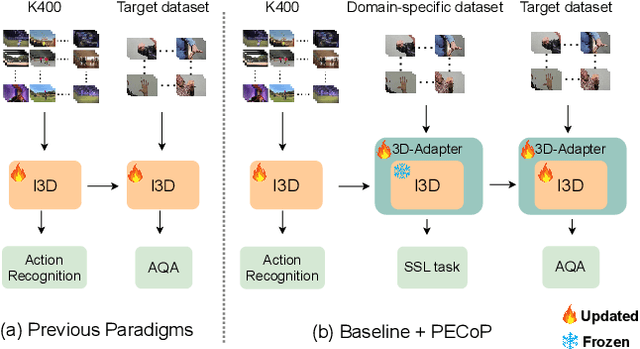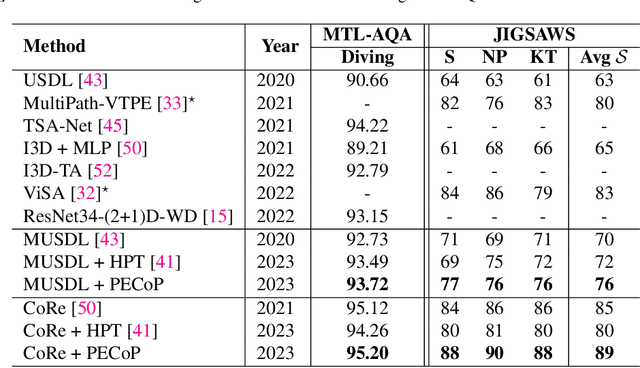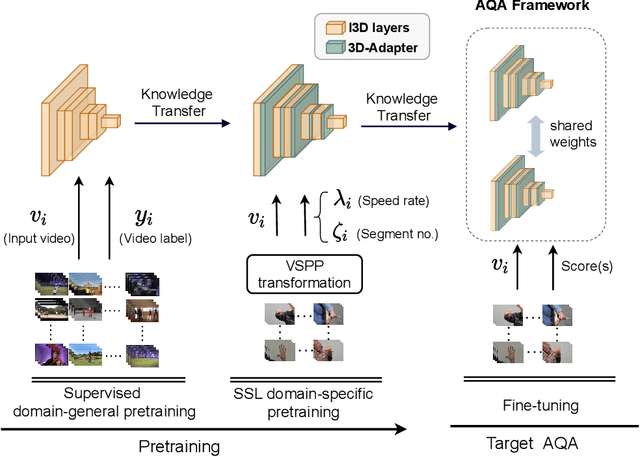Shuchao Duan
Trajectory-guided Motion Perception for Facial Expression Quality Assessment in Neurological Disorders
Apr 16, 2025Abstract:Automated facial expression quality assessment (FEQA) in neurological disorders is critical for enhancing diagnostic accuracy and improving patient care, yet effectively capturing the subtle motions and nuances of facial muscle movements remains a challenge. We propose to analyse facial landmark trajectories, a compact yet informative representation, that encodes these subtle motions from a high-level structural perspective. Hence, we introduce Trajectory-guided Motion Perception Transformer (TraMP-Former), a novel FEQA framework that fuses landmark trajectory features for fine-grained motion capture with visual semantic cues from RGB frames, ultimately regressing the combined features into a quality score. Extensive experiments demonstrate that TraMP-Former achieves new state-of-the-art performance on benchmark datasets with neurological disorders, including PFED5 (up by 6.51%) and an augmented Toronto NeuroFace (up by 7.62%). Our ablation studies further validate the efficiency and effectiveness of landmark trajectories in FEQA. Our code is available at https://github.com/shuchaoduan/TraMP-Former.
QAFE-Net: Quality Assessment of Facial Expressions with Landmark Heatmaps
Dec 01, 2023Abstract:Facial expression recognition (FER) methods have made great inroads in categorising moods and feelings in humans. Beyond FER, pain estimation methods assess levels of intensity in pain expressions, however assessing the quality of all facial expressions is of critical value in health-related applications. In this work, we address the quality of five different facial expressions in patients affected by Parkinson's disease. We propose a novel landmark-guided approach, QAFE-Net, that combines temporal landmark heatmaps with RGB data to capture small facial muscle movements that are encoded and mapped to severity scores. The proposed approach is evaluated on a new Parkinson's Disease Facial Expression dataset (PFED5), as well as on the pain estimation benchmark, the UNBC-McMaster Shoulder Pain Expression Archive Database. Our comparative experiments demonstrate that the proposed method outperforms SOTA action quality assessment works on PFED5 and achieves lower mean absolute error than the SOTA pain estimation methods on UNBC-McMaster. Our code and the new PFED5 dataset are available at https://github.com/shuchaoduan/QAFE-Net.
PECoP: Parameter Efficient Continual Pretraining for Action Quality Assessment
Nov 11, 2023



Abstract:The limited availability of labelled data in Action Quality Assessment (AQA), has forced previous works to fine-tune their models pretrained on large-scale domain-general datasets. This common approach results in weak generalisation, particularly when there is a significant domain shift. We propose a novel, parameter efficient, continual pretraining framework, PECoP, to reduce such domain shift via an additional pretraining stage. In PECoP, we introduce 3D-Adapters, inserted into the pretrained model, to learn spatiotemporal, in-domain information via self-supervised learning where only the adapter modules' parameters are updated. We demonstrate PECoP's ability to enhance the performance of recent state-of-the-art methods (MUSDL, CoRe, and TSA) applied to AQA, leading to considerable improvements on benchmark datasets, JIGSAWS ($\uparrow6.0\%$), MTL-AQA ($\uparrow0.99\%$), and FineDiving ($\uparrow2.54\%$). We also present a new Parkinson's Disease dataset, PD4T, of real patients performing four various actions, where we surpass ($\uparrow3.56\%$) the state-of-the-art in comparison. Our code, pretrained models, and the PD4T dataset are available at https://github.com/Plrbear/PECoP.
 Add to Chrome
Add to Chrome Add to Firefox
Add to Firefox Add to Edge
Add to Edge